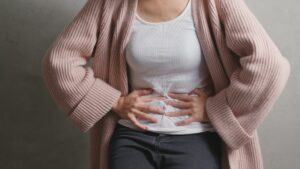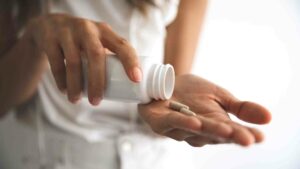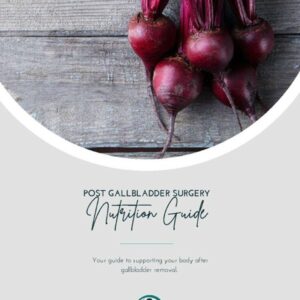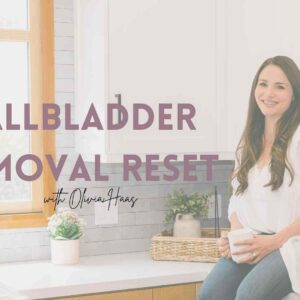7 Strategies for Minimizing Bile Acid Diarrhea After Gallbladder Removal
Although gallbladder removal surgery is a common procedure, several patients still experience a multitude of digestive symptoms as they recover.
One of the common symptoms after getting your gallbladder removed is Bile Acid Diarrhea.
Up to 20% of people undergoing gallbladder surgery unfortunately develop diarrhea post-op.1
So how do you get rid of this super uncomfortable symptom?
There are ways to minimize– and even eliminate bile acid diarrhea after gallbladder removal. And I’m here to walk you through exactly how.
As a Functional Gallbladder Nutritionist, my mission is to empower people like you with the knowledge and tools needed for a healthy post-op recovery.
Contrary to what your doctor may have told you, you can’t just go back to eating whatever you want after getting your gallbladder removed… it’s not a quick fix! But with my post-op recommendations, you’ll feel much more prepared.
Let’s dive into what bile acid diarrhea is, and then go through 7 effective strategies for minimizing its impact on your post-op life.
What Is Bile Acid Diarrhea?
Bile acids play a vital role in digestion. Bile is released from the gallbladder to help break down and absorb fats.
When you get your gallbladder removed, bile release is disrupted. Bile acids become poorly absorbed in your digestive system, which means more bile acids are moving through your gut.
Bile acids cause fluid secretion and increased mucosal permeability in the colon. So when you have excess bile acids causing this excess fluid, it leads to diarrhea.2
There’s a name for this – Bile Acid Malabsorption– and it goes hand in hand with post-op diarrhea because the excess bile almost acts as a laxative in your body.
What Are The Signs of Bile Acid Diarrhea?
Bile acid diarrhea certainly is an uncomfortable side effect of getting your gallbladder removed. And it can impact your daily life when not under control.
You may be experiencing post-op bile acid diarrhea if:
- You’re experiencing more frequent loose stools.
- You have a sense of urgency, finding yourself running to the bathroom.
- You have diarrhea for multiple days at a time.
- You’re experiencing excessive gas and abdominal pain.
- You’ve found yourself feeling out of control holding your stool.
Trust me, I know…these are NOT fun symptoms to talk about. And a lot of the time, it’s awkward to address in the first place. That’s why I want to give you the tools to help manage this symptom from home.
So you can go back to living your life without the constant worry of bile acid diarrhea!
The key to reducing your symptoms is checking in with your diet and lifestyle.
You should NOT just rely solely on bile binder medications, fiber supplements, or medicating with imodium.
These are quick fixes that just put a bandaid on diarrhea, but it won’t go away without addressing post-op bile acid malabsorption.
Let’s look at my top 7 nutrition and lifestyle recommendations that help treat bile acid malabsorption at the source, so you can experience far less bile acid diarrhea after your gallbladder removal.
Top 7 Strategies for Minimizing Post-op Bile Acid Diarrhea
As a functional nutritionist focusing on all things gallbladder, here are 7 of the top recommendations I give my clients to reduce post-gallbladder removal bile acid diarrhea– for good!
1. Make Your Own Meals
Cook more of your meals at home! I know… takeout can be so easy. But preparing your own food reduces GI inflammation that can make your symptoms way worse.

You can be in charge of knowing how much salt, butter, oil, and other irritants make their way into your food when you cook for yourself. When you’re in control of keeping your fat intake to a minimum, you’re able to keep bile acid diarrhea at bay.
2. Swap out and reduce triggers
Common triggers for bile acid diarrhea (and other digestion-related symptoms) include:
- Alcohol
- Excess gluten
- Too much sugar
- Coffee
Alcohol and several bread products are packed with sugars whether we realize it or not.
Sugars can stimulate your gut to produce water and electrolytes, which loosens your stool. When you avoid excess sugar in your diet, you reduce your risk of diarrhea.
3. Change Your Morning Beverage
Avoid caffeine– especially early in the day or on an empty stomach. Yes, this means your morning coffee!
Regular AND decaffeinated coffee both stimulate gallbladder function and contractility, which increases the production of bile in your system.3
And as you’ve learned, that excess bile contributes to diarrhea.
Try swapping your coffee with an herbal tea to reduce caffeine consumption. Matcha tea is a great swap! Also iced or decaf coffee tends to be less stimulating for most.
I know this can be hard! But avoiding caffeine, especially on an empty stomach or around meals, will reduce bile acid diarrhea.
4. Minimize Processed Foods and Unhealthy Fats
Try avoiding inflammatory vegetable oils, fried foods, and packaged foods.
Instead, stick to a healthy balanced diet full of veggies, protein, fiber, and healthy fats!
Healthy fats are good for you but processed, unhealthy fats lead to worsening bile acid diarrhea.
Studies show that a low-fat diet reduces bile acid production and release into your digestive system after a meal. And with less circulating bile acids in the gut, your risk for diarrhea reduces. 4
Patients report improvements in bowel urgency and frequency, along with bloating and abdominal pain when following a low-fat diet.4
5. Consider Digestive Supplements
Some of my clients swear by their digestive supplements and herbs. Common helpful supplements and herbs include probiotics, digestive enzymes, ginger root, and milk thistle. 
Probiotics containing Lactobacillus bacteria can reduce the amount of bile acids that reach your gut, which in turn reduces the severity of bile acid diarrhea.5
Replacing digestive enzymes through supplementation also can help digest proteins, carbs, and fat to reduce the need for more bile acids in your digestive tract.6
I have a whole blog on my site with my top supplement recommendations for gallbladder support, so check it out here!
Make sure you always consult with a doctor before starting any new supplement or medication.
6. Space Out Your Meal Times
This is a lifestyle adjustment that not only reduces bile acid diarrhea but also helps ease other digestive symptoms.
Rather than eating one or two large meals each day, opt for smaller, more frequent meals.
I like to follow this schedule: breakfast, snack, lunch, snack, dinner, snack.
When you eat balanced meals spaced out over the course of the day, your body has more time to adapt to your food intake.
7. Practice Mindful Eating
This is a game-changer when it comes to minimizing digestive symptoms, especially bile acid diarrhea!
I always recommend taking 5 deep breaths before EVERY meal. You never want to eat on the go or show up to meals stressed or distracted. This throws your system out of whack and makes digestion a bigger process for your body.
When you take your time eating– limiting distractions and stressors– your body will thank you.
Feel Confident In Minimizing Post-Gallbladder-Removal Symptoms
Bile Acid Diarrhea is one of many symptoms you may go through after getting your gallbladder removed. But don’t worry! I’ve got the tools to help you feel your best post-op.
By incorporating these 7 strategies into your daily life, you can minimize the impact of bile acid diarrhea and enjoy a healthier post-gallbladder-removal experience.
Remember that taking proactive steps toward your nutrition and lifestyle makes a huge difference in your overall well-being.
There are a lot more ways to reduce– even eliminate– common post-op symptoms.
For more guidance on your post-op recovery, I’d love for you to join me in my Gallbladder Removal Reset Program.
Gallbladder Removal Reset Program is jam-packed with everything you need to know about recovering from gallbladder removal surgery. It’s loaded with content, Live Q&As, and a community of others going through gallbladder removal surgery just like you.
So come out of your gallbladder removal surgery as an empowered patient, and know that you have the tools you need to recover easily with my Gallbladder Removal Reset program.
I can’t wait to see you inside the program. Until then, here’s to your post-op health and self!
References
Glazier, E., Ko, E. Watery stool can still occur after gall bladder surgery. Ask The Doctors. UCLA Health. 2021 April 17.
Farrugia A, Arasaradnam R. Bile acid diarrhoea: pathophysiology, diagnosis and management. Frontline Gastroenterol. 2020 Sep 22;12(6):500-507. doi: 10.1136/flgastro-2020-101436. PMID: 34712468; PMCID: PMC8515273.
Nehlig A. Effects of Coffee on the Gastro-Intestinal Tract: A Narrative Review and Literature Update. Nutrients. 2022 Jan 17;14(2):399. doi: 10.3390/nu14020399. PMID: 35057580; PMCID: PMC8778943.
Hughes LE, Ford C, Brookes MJ, Gama R. Bile acid diarrhoea: Current and potential methods of diagnosis. Annals of Clinical Biochemistry. 2021;58(1):22-28. doi:10.1177/0004563220966139
Michael R. Page, P. (2021, March 4). Probiotic supplements for irritable bowel syndrome and intestinal illness. Pharmacy Times. https://www.pharmacytimes.com/view/probiotic-supplements-for-irritable-bowel-syndrome-and-intestinal-illness
Ianiro G, Pecere S, Giorgio V, Gasbarrini A, Cammarota G. Digestive Enzyme Supplementation in Gastrointestinal Diseases. Curr Drug Metab. 2016;17(2):187-93. doi: 10.2174/138920021702160114150137. PMID: 26806042; PMCID: PMC4923703.

